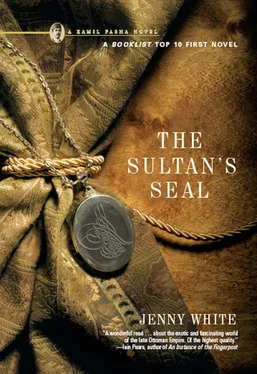Jenny White - The Sultan's seal
Здесь есть возможность читать онлайн «Jenny White - The Sultan's seal» весь текст электронной книги совершенно бесплатно (целиком полную версию без сокращений). В некоторых случаях можно слушать аудио, скачать через торрент в формате fb2 и присутствует краткое содержание. Жанр: Исторический детектив, на английском языке. Описание произведения, (предисловие) а так же отзывы посетителей доступны на портале библиотеки ЛибКат.
- Название:The Sultan's seal
- Автор:
- Жанр:
- Год:неизвестен
- ISBN:нет данных
- Рейтинг книги:5 / 5. Голосов: 1
-
Избранное:Добавить в избранное
- Отзывы:
-
Ваша оценка:
- 100
- 1
- 2
- 3
- 4
- 5
The Sultan's seal: краткое содержание, описание и аннотация
Предлагаем к чтению аннотацию, описание, краткое содержание или предисловие (зависит от того, что написал сам автор книги «The Sultan's seal»). Если вы не нашли необходимую информацию о книге — напишите в комментариях, мы постараемся отыскать её.
The Sultan's seal — читать онлайн бесплатно полную книгу (весь текст) целиком
Ниже представлен текст книги, разбитый по страницам. Система сохранения места последней прочитанной страницы, позволяет с удобством читать онлайн бесплатно книгу «The Sultan's seal», без необходимости каждый раз заново искать на чём Вы остановились. Поставьте закладку, и сможете в любой момент перейти на страницу, на которой закончили чтение.
Интервал:
Закладка:
“Ismail Dayi is hardly ever here and Mama refuses to listen to anything. It’s as if I’m a child again.” I thought of poor Mama lying on her divan, coughing, wrapped in her fur cloak despite the warm balm of spring, and felt my complaint stick in my stomach. “I hope Mama gets well soon,” I whispered by way of apology. What is written will come to be, but what is spoken also provokes fate.
Violet walked silently by my side. I had become accustomed to her new silences. I remembered her crying in her room when she first arrived at Chamyeri. She must be lonely, I decided. I looked at her out of the corner of my eye. Her mouth was tight and a frown had settled onto her forehead. Perhaps it was time I asked Ismail Dayi or Papa to find her a husband.
We passed orchards behind crumbling brick walls. Fig leaves draped the walls like dark green hands moving in the slight breeze, guarding the small, prim sacs of fruit. Pairs of doves with wine-red necks called softly to one another. We entered the shade of a narrow lane beneath overhanging second stories.
Violet looked about nervously.
“What is it?” I whispered.
“Nothing. Nothing at all.”
Violet was lying. Something was worrying her.
At the open square in the center of the village, the small grocery stall was still closed. Two bony dogs slunk grudgingly around the back of the stall at our approach. Another dog lay on his side in the dust, his back leg twitching. Several old men were sitting on low, straw-thatched wooden stools under a tatty awning, drinking tea. Their eyes shifted to watch us pass.
We crossed the square quickly and plunged into the darkness of a narrow street leading to the shore. The overhanging upper stories of the wooden houses almost met overhead. We were here to rent a boat that would take us down the strait to Beshiktash, the nearest pier to Nishantashou. I knew Mama would not allow us to go. Without her authority, I could not send a servant to hire a boat, so I convinced an unwilling Violet to come along. I left a note for Mama and Ismail Dayi, telling them I had gone back to Papa’s house. My uncle’s house would always be home, but I felt the need to resume my life. Now that I was no longer to be married, I had to think about what to do. I had never much desired the company of society, but I was lonely too. In the city, I hoped at least to resume my education.
As we passed beneath the Muslim houses, I heard women calling to one another behind the wooden lattices covering the windows. Suddenly a bucketful of foul water landed beside us and exploded over our cloaks. Appalled, I stopped and looked up at the woman still leaning from her window, bucket in hand, smiling. Voices and muffled laughter came from behind the lattices along the street. Violet took my hand and rushed me forward, almost knocking over the man ahead of us.
We ran to the open area by the shore. Young men sat on the stones and mended nets. The fishing boats had left long before dawn. The men stopped their work and looked at us curiously. Our feradjes were spattered with yellow stains. We adjusted our veils more tightly. My hand was still in the vise of Violet’s grip. I had understood what Violet already knew. We had to leave here. Surely the matrons of Nishantashou would not throw slop on us. I felt certain they had more sophisticated means of cutting the rope that tethered me to society’s ship.
I was suddenly very angry. I loosed my hand from Violet’s, straightened my shoulders, and walked to the man tending the samovar.
“I would like to rent a boat and a boatman to take us to Beshiktash pier. You will be well compensated.”
Violet’s small face was dark and strong, almost muscular, made up of planes and angles. She was attractive in a masculine way, the only hint of softness rich, liquid brown eyes that tilted up at the outer corners like almonds. Impatient, she continually shifted and readjusted her position, her thin fingers pulling at her clothing, so unlike when she was naked in the water, where she became tranquil and sleek.
I remember how disgusted she was at the exorbitant price of ten kurush the boatman demanded. Then he had the temerity to require another two kurush for the tea seller.
“They can smell desperation, these lowlifes,” she whispered through our yashmaks. “They’d take advantage of their mothers.”
The trip down the Bosphorus was uneventful. The boatman hardly had to move the oars; the current did all the work. He spent his time leering at us. When we landed at Beshiktash, however, he handed us onto the pier without incident.
Violet had charge of the purse. She was much better at keeping an eye on it in a crowd. The quay was crowded-boatmen, passengers, fishermen unloading their catches, buyers for the fish, and the usual street vendors, porters, and beggars. Violet kept hold of my arm as we pushed through the crowd, looking to hire a carriage to take us to Nishantashou. We were not on a main street. She pointed to a large carriage-really, much too large to have any business on that street-stopped right by the pier. We noticed it right away because the horses had such colorful traces-red and blue. The driver was short and powerfully built, with light-colored hair in tight curls, like the spring lamb Halil once bought to be slaughtered for our feastday meal. Dressed in ordinary working garments, he wore the black shoes of a Jew. Violet haggled briefly and then helped me into the box, while the driver climbed up front. I remember she was puzzled by the low price. “He wasn’t at all interested in bargaining,” she told me. “He looked rather like he was in a hurry.”
The carriage was very dark when I climbed in. When I turned to look for Violet a smell suddenly caught at my throat. The coach jerked harshly forward. Dark wings gripped me in the small space. I saw a flash and Violet flung into the light. Then only the light remained, then nothing.
The low, plaintive call of the itinerant scrap merchant. It was so familiar; the drawn-out first letter, a rapid stutter of consonants, then the tail of the word, laid like a peacock’s fan over the street behind his cart. I was in my room at Nishantashou, waiting for Violet to draw the curtains and wake me. I began blissfully to stretch my limbs, but the dimensions of the bed were wrong, the covers too heavy.
I opened my eyes and saw an unfamiliar ceiling high above me, consisting of parallel rows of shallow arches. The tall windows were blocked with white-painted iron shutters, held shut by a heavy crossbar. I was in a narrow bed, covered by a heavy blue comforter. I was fully dressed, except for my shoes, feradje, and veil. I walked to a window, but the bar was locked in place. Street sounds penetrated faintly through the shutters-the rattle of a cart, vendors calling their wares, the sudden shriek of a child. I put on my shoes. My cloak hung from a hook on the wall. It had been cleaned and pressed. The yellow stains were gone. I moved quietly to the door. To my surprise, it was unlocked. I pulled down the handle slowly, opening the door only a fraction, then pressed my eye to the crack.
An old woman was sitting on a carpet on the floor, a copper bowl of aubergines between her legs. She took a vegetable in her hand, carefully cut off the stem, then skillfully cored it. Replacing the end, she laid the now-hollow eggplant into another bowl beside her.
“Come,” she said, without looking in my direction. I opened the door another fraction. Where was Violet?
“Come, come.”
I opened the door wide. There was no one else in the room. It was furnished with a divan covered not with silk and velvet cushions, but with colorful flowered cotton. The carpet was threadbare, but the broad wooden boards beneath it gleamed. The windows were open and a soft breeze carried into the room the sounds I had heard before. From one window, I saw the façade of another building through the lace curtains; from the other, the leaf-laden branches of a linden tree, wagging in the sunlight. The room was cool.
Читать дальшеИнтервал:
Закладка:
Похожие книги на «The Sultan's seal»
Представляем Вашему вниманию похожие книги на «The Sultan's seal» списком для выбора. Мы отобрали схожую по названию и смыслу литературу в надежде предоставить читателям больше вариантов отыскать новые, интересные, ещё непрочитанные произведения.
Обсуждение, отзывы о книге «The Sultan's seal» и просто собственные мнения читателей. Оставьте ваши комментарии, напишите, что Вы думаете о произведении, его смысле или главных героях. Укажите что конкретно понравилось, а что нет, и почему Вы так считаете.












